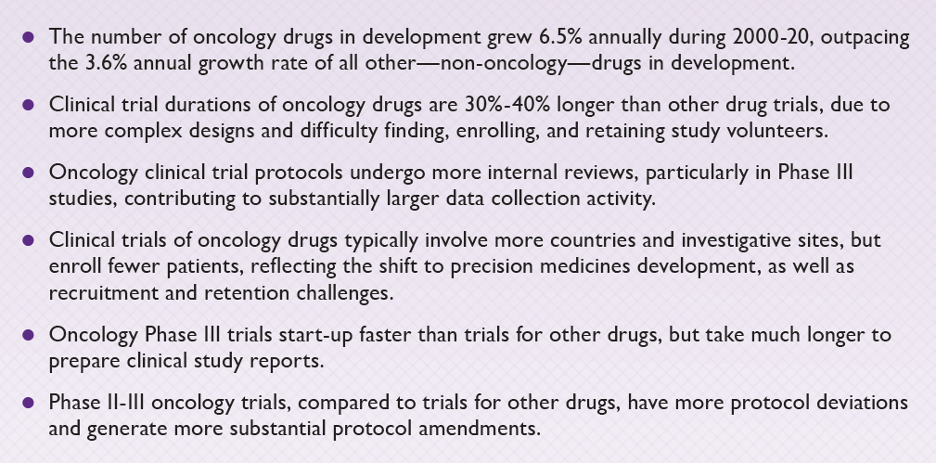Blog
Protocol Complexity and Patient Enrollment Intensify Challenges in Oncology Trials
Jul 02, 2021 | Richard Young
Jul 02, 2021 | Richard Young
In May 2021, Tufts Center for the Study of Drug Development published their latest IMPACT report on oncology research. The six headline conclusions make for very interesting reading:
Source: Tufts CSDD, IMPACT Report, Volume 23, Number 3, May/June 2021
Each of these conclusions have implications for your technology that warrant exploration, because technology choices shape our approach to supporting clinical trials. Here is how I believe they can be interpreted:
- High growth (6.5% annually) in oncology trials: The greater volume of studies will drive the need for greater efficiencies in build, execution, and close-out activities, but will also lead to a revaluation of strategy. As an industry, we need to embrace more innovative designs to counter the escalating workloads. This is right for patients, investigators, and researchers everywhere.
This means we will embrace bucket, umbrella, and platform trials, combined with a fully adaptive strategy. These designs will call for a level of flexibility and control not previously available. The need to create study solutions (EDC and external data streams) ahead of FPFV will be of ever-increasing importance, driving the need for even more efficiency. - Oncology trials see substantially larger data collection activity: The data volume is not just increasing, it is exploding. EDC is not the answer. Seventy percent of study data is now managed outside of EDC, and that number is increasing. There is an urgent need for a complete data management solution. This is where Veeva CDB will enable better data cleaning, but also better automation, as we explore metadata-driven curation and cleaning.
- Clinical trial durations of oncology drugs are 30%-40% longer: Duration impacts overall costs, and the need to explore new models to create better solutions, especially for long term follow-up. It also drives new methods to enable better control of cohorts, arms, and phases, as well as strategies for interim analyses and key milestone management. These speak to the core of EDC.
- Clinical trials of oncology drugs enroll fewer patients: In a competitive world, placing the right patient in the right trial, at the right time will become yet more important. This is not just a need as we complete initial consent and screening, but as we proceed through multiple decision points and adaptations, technology must continue to lead.
- Oncology Phase III trials take much longer to prepare clinical study reports: The ability to aggregate and integrate all data will be critical not only to timely decision making, but also to downstream processes. Completing the data journey from concept to conclusion, will see data technology drive from PRM – ODM – SDTM – AdAM and beyond, connecting protocol to submission in a metadata driven process. One data point will define the need for the next and shape the content of the future.
- Phase II-III oncology trials generate more substantial protocol amendments: Amendments are the Achilles heel of traditional EDC systems. The recent Tufts publication (Planned and unplanned mid-study updates challenge clinical trial timelines) clearly illustrates the downside of inflexible EDC solutions, where it takes, on average, 30 days to implement an amendment. This is too long. Delays disrupt the study flow and create angst across the R&D ecosystem. Knowing that we will do more amendments, not fewer going forward, we must tackle this once and for all. Vault EDC was designed to enable prospective and retrospective amendments without the need for a migration. Add to that the ability to test amendments through impact analyses, to implement at the item level, and to affect changes in near real-time, uniquely enables Vault EDC to provide the flexibility that oncology studies demand.
Learn more strategies to better handle oncology trial challenges in my webinar with Ken Getz of Tufts CSDD. Register here.
